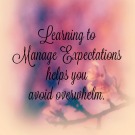The word grief conjures up images of solitary weeping people consumed by misery. According to Dictionary.com, grief is defined as “mental suffering or distress over affliction or loss; sharp sorrow; painful regret.” Grief encompasses many emotions, some of them conflicting (ie sadness and relief), and regardless of how long we live, at some point we will all have to experience it.
Sadly, grief is often extremely hard to manage in the modern world because society expects us to bounce back and move on. These expectations often lead to feelings of guilt and fear; if we don’t bounce back, we feel guilty because we believe we should be moving on. We also fear we’ll be seen as weak, ineffective, and even mentally deficient. This guilt and fear ultimately leads us to run away from working with our grief which will make us feel even worse. So instead of running away, the following four tips can help manage grief and move toward the one thing we need to be doing which is, finding acceptance.
Ask for and accept help
Accepting that you will need help in terms of practical matters such as job leave and day to day activities is one of the first things you can do to make your journey through grief less guilt ridden and stressful. If you’re a Super Hero Do It All person, it may be extremely difficult to take off your cape, lay down your armor, and let others do things for you, but now is the time to do just that. Many times, people have the best intentions but may not know how to help.
You can make your life easier and theirs as well by focusing on what would benefit you most and then asking for those things. Remind yourself that by accepting and asking for help, you are in fact helping yourself and those that care about you as well.
Accept your grief on every level
The rapid pace of society doesn’t encourage us to get deeply in touch with our emotions. Instead, it encourages us to process things quickly and efficiently, and move on. Grief will not allow you to do this; if you do not accept your grief it will continue to stay with you until you do. Deep tangled emotions are messy and can’t be dealt with as though they’re quick and easy transactions. By accepting your grief, feeling those emotions without censoring them, and seeking grief counseling if you feel you need it, you are setting yourself up to feel better both in the short and long run. Also remember that grief is not depression; depression can fall under the umbrella of grief but grief itself is not a mental illness.
Accept there is no time frame
One of the biggest challenges with grief is that moving through it is not linear and there is no timeframe. And because you’re in pain and just want it to stop, this lack of timeline can feel crushing; you don’t know when your misery is going to end and you just want to see the light at the end of the tunnel. This can be made more difficult by the timelines others put on your grief; you have a certain amount of time off from work, you feel pressure to get back to “normal” at home, and friends will also expect you be back to your old self sooner or later. By accepting that there is no timeframe, knowing that moving through grief is more of a managing exercise vs. a making it go away forever exercise, you can help others understand your grieving process. This can also help you be kind to yourself as you continue to recover.
Accept that others may not understand your approach to grief
Accepting grief and working through it in ways that tend to your deeply felt emotions may not be accepted by everyone because this process goes against the bounce back /move forward mentality that much of society has embraced. Because there is no timeline for how you work through grief, this approach will not conform to what others think you “should” be doing. You may seek help in ways they don’t agree with, or, because of the lack of timeline, they may think you’re stuck. Seek the help of both professionals and caring friends, and trust that your process is what you need. Communicate what you can to those who may not understand your approach and know that it is up to them to choose whether or not they continue to support you.
Managing grief is a long and winding road that can ultimately lead you to a place of peace. Through accepting your grief and working with it – outside of the confines of what modern society dictates – you can get back to a life that is forever altered, yet hopefully more cherished because of your journey.
Sources:
http://blog.griefrecoverymethod.com/blog/2013/06/best-grief-definition-you-will-find
https://www.psychologytoday.com/blog/the-new-grief/201203/when-does-grief-become-depression
Further Resources:
The Orphan Adult (Alexander Levy)
Progressing Through Grief (Stephanie Jose)






